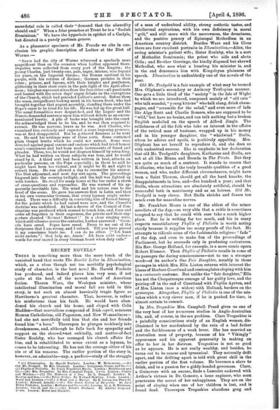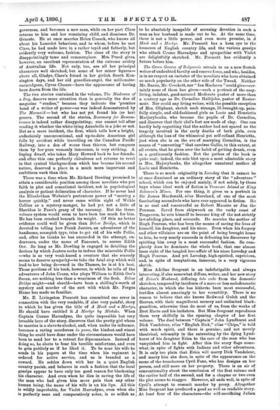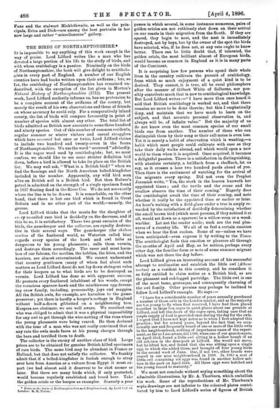RECENT NOVELS.*
THERE is something more than the mere touch of the vanished hand that wrote The Scarlet Letter in Illumination, which, as a close though not too morbidly psychological study of character, is the best novel Mr. Harold Frederic has produced, and indeed places him very near, if not quite at the head, of the newest school of American fiction. Theron Ware, the Wesleyan minister, whose intellectual illumination and moral fall are told in this story, is not such an almost heroically tragic figure as Hawthorn's greatest character. That, however, is rather his misfortune than his fault. He would have aban- doned his church and his home, and eloped with Celia Madden—that marvellous compound of Irish esprit, sensuous Roman Catholicism, old Paganism, and New Womanliness— had she not mercifully told him that she and her friends found him "a bore." Thereupon he plunges recklessly into drunkenness, and, although he falls back for sympathy and support on the shrewd,-hnot unkindly, and matter-of-fact Sister Soulsby, who has managed his church affairs for him, and is rehabilitated to some extent as a layman, he ceases to be interesting. He has not the courage either of his sin or of his remorse. The earlier portion of the story is, however, an admirable—nay, a perfect—study of the struggle • (L) Illumination. By Harold Frederic. London : W. Heinemann.. —(2) Old Mr. Tredgold. By Mrs. Oliphant. London : Longmans, Green, and Co.— (3.) Phyllis of Philistia. By Frank Frankfort Moore. London: Hutchinson and Co.—(4.) Mrs. Tregaskiss. By Mrs. 0 onpbell Praed. 3 vols. London : Chatto and Window—(S.) The Madonna of a Day. By L. Donnell. London: R. Bentley and Son.—(6.) Below Bridge. By Wchard Dowling. 3 vole. London : Ward and Downey.—(7.) A Mask and a Martyr. By E. Living.ton Prescott. London: Edward Arnold.—(6.) The Green Grates of Ba'goterie. By Jars Helen Findnster. London : Methuen and Co.—(9.) Loveday. Br A. R. Wickham. London : Cavell end Co —(10.) Erica's Husband. By Adeline Serge.u.t. 2 role. Loudon: Hurst and Blanket:, of a man of undoubted ability, strong aesthetic tastes, and
intellectual aspirations, with his own deficiency in moral " grit," and still more with the narrowness, the dreariness, and the positive penury of Episcopal Methodism in an
American country district. Besides Ware and his Circe there are four excellent portraits in Illumination,—Alice, the
erring minister's patient wife ; Sister Soulsby, who is a sort of Methodist Semiramis ; the priest who aids and abets Celia; and Brother Gorringe, the kindly disposed but shrewd
Methodist, who sees what a humbug his minister is, and in the end denounces him with Kingsleyan plainness of speech. Illumination is undoubtedly one of the novels of the year.
Old Mr. Tredgold is a fair example of what may be termed Mrs. Oliphant's secondary or Anthony Trollopian manner.
One gets a little tired of the " society " in the Isle of Wight to which we are introduced, composed mainly of "old cats" who talk scandal, "young kittens" who talk slang, drink cham- pagne, and "scramble for the salad," and even more of lads like Algy Scott and Charlie Somers, who are supposed to be " wild," but have no brains, and can talk nothing but a broken English modelled on the speech of Alfred Jingle. The selfishness of all the folk who take an interest in the affairs of the retired man of business, wrapped up in his money and in his younger daughter, the " whirlwind" Stella,
whom he adores and spoils, is positively appalling. Mrs. Oliphant has set herself to reproduce it, and she does so with undoubted success. She is emphatic in her declaration that old Mr. Tredgold's daughters, Katharine and Stella, are not at all like Minna and Brenda in The Pirate. But they
are quite as much of a contrast. It stands to reason that
Katharine, who has all the truly loveable qualities of a good woman, and who, under different circumstances, might have
been a Saint Theresa, should get all the hard knocks, the disappointments in love, and—five hundred a year; and that Stella, whose attractions are absolutely artificial, should be
successful both in matrimony and as an heiress. Old Mr. Tredgold is very clever. But Stella shrieks and fusses too much even for masculine nerves.
Mr. Frankfort Moore is one of the ablest of the minor novelists of the day,—so very able that a critic is sometimes tempted to say that he could with ease take a mach higher
place. Bat be is writing far too much, and his in many respects unsatisfactory Phyllis of Philistia is worth noting chiefly because it supplies too many proofs of the fact. He
attempts to ridicule some of the fashionable religious " fads " of the day, and even to make fun of the proceedings of Parliament, but he succeeds only in prodaoing caricatures.
His Rev. George Holland, for example, is a mere comic opera Robert Elsmere. Then Phyllis of Philistia recalls in some of its passages the daring sensuousness—not to use a stronger word—of its author's One Fair Daughter, notably in those passages in which Mrs. Ella Linton returns with interest the kisses of Herbert Courtland and contemplates eloping with him in a ravissante costume. But unlike the "fair daughter," Ella
has not the Cleopatresque courage of her guilty love, and the pairing-off in the end of Courtland with Phyllis Ayrton, and of Mrs. Linton (now a widow) with Holland, borders on the
grotesque. Altogether, Phyllis of Philistia is one of the mis- takes which a very clever man, if he is pushed for time, is almost certain to commit.
In Mrs. Tregaskiss Mrs. Campbell Praed gives us one of the very best of her numerous studies in Anglo-Australian life, and, of course, in the sex problem. Clare Tregaskiss is a painfully conscientious study of an English woman, dis- illusioned in her maidenhood by the ruin of a bad father and the faithlessness of a weak lover. She has married an Australian man of property, because of his " Vikingly" appearance and his apparent generosity in making an offer to her in her distress. Tregaskiss is not so good as be appears. He is not really wealthy, and besides, he turns out to be coarse and tyrannical. They naturally drift apart, and the drifting apart is told with great skill in the earlier portion of the first volume. He becomes a slave to drink, and to a passion for a giddy-headed governess. Clare, a Guinevere with an excuse, finds a Lancelot endowed with Arthur's virtues in Dr. Geneste, a lame explorer, who soon penetrates the secret of her unhappiness. They are on the point of eloping when one of her children is lost, and is found dead. Thereupon Tregaskiss abandons grog and
governess, and becomes a new man, while on her part Clare returns to him and her remaining child, and dismisses Dr. Geneste. He at once marries Helen Cusack, who knows all about his Lancelot behaviour, and to whom, before he met Clare, he had made love in a rather tepid and fatherly, but evidently very welcome, fashion. The close of the story is disappointingly tame and commonplace. Mrs. Praed gives, however, an excellent representation of the extreme aridity of Australian life. Not only, too, are all her principal characters well sketched, but some of her minor figures— above all, Gladys, Clare's friend in her girlish South Ken- sington days, and her old guardian-angel, the millionaire- curmudgeon, Cyrus Chance—have the appearance of having been drawn from the life.
The two stories contained in the volume, The Madonna of a Day, deserve more attention than is generally the due of magazine " studies," because they indicate the 'prentice hand of a writer of power—as was indeed demonstrated by The Mermaid—but who has not yet found his (or her) groove. The second of the stories, Rosemary for Remem- brance is indeed rather disappointing; one cannot tell after reading it whether the white-lying Annabella is a joke or not. Bat as a mere incident, the first, which tells how a bright, audaciously unconventional, and up-to-date American girl falls by accident while travelling on the Canadian Pacific Railway, into a den of worse than thieves, but conquers them by her pure womanly innocence, is very striking. A lisping dwarf, who takes Mary Howard back to her friends, and after this one perfectly chivalrous act returns to revel in that cynical blackguardism which has become his second nature, deserved a place in a much more important and ambitious work than this.
There was a time when Mr. Richard Dowling promised to attain a considerable position among those novelists who put faith in plot and sensational incident, not in psychological analysis or patient delineation of character. If he never had the Elizabethan Webster's portentous power of "moving a horror quickly," and never came within sight of Wilkie Collins as a mystery-monger, he had yet not a little of Sheridan le Fames grasp of the uncanny. But the three- volume system would seem to have been too much for him. He has been crushed beneath its weight. Of this no better evidence could well be given than Below Bridge, which is devoted to telling how Frank Jeaters, an adventurer of the handsome, scampish type, tries to get rid of his wife Pollie, and, after he thinks he has succeeded in the attempt, en- deavours, under the name of Fancourt, to secure Edith Orr. So long as Mr. Dowling is engaged in detailing the devices by which Jeaters seeks to induce the miserable Pollie —who is so very weak-kneed a creature that she scarcely seems to deserve sympathy—to take the fatal step which will lead to her being drowned in the Thames, he is at h's best. Those portions of his book, however, in which he tells of the adventures of John Crane, who plays William to Edith Orr's Susan, are nothing less than a weariness of the flesh. Below Bridge might—and should—have been a shilling's-worth of mystery and murder of the sort with which Mr. Fergus Hume has made us familiar.
Mr. E. Livingston Prescott has committed one error in connection with the very readable, if also very painful, story to which he has given the title of A Mask and a Martyr. He should have entitled it A Martyr by Mistake. When Captain Cosmo Harradyne, the quite impossible but very loveable hero of the story, discovers that the pretty girl whom he marries is a slave to alcohol, and, when under its influence, becomes a raving murderess in posse, the kindest and wisest thing he could have done under the circumstances would have been to send her to a retreat for dipsomaniacs. Instead of doing so, he elects to bear his terrible misfortune, and even to grin publicly as if he liked it. To be near his wife he sends in his papers at the time when his regiment is ordered for active service, and so is branded as a coward. He settles down with her in a quiet English country parish, and behaves in such a fashion that the local gossips appear to have only too good reason for blackening his character. And even when he dies in saving the life of the man who had given him more pain than any other human being, the name of his wife is on his lips. All this is wildly improbable, for Violet Harradyne, even when she is perfectly sane and comparatively sober, is so selfish as to be absolutely incapable of arousing devotion in such a man as her husband is made out to be. At the same time, there is not a little power, and even more promise, in A Mask and a Martyr. Mr. Prescott has a keen eye to the humours of English country life, and the various gossips who attack Cosmo Harradyne and sympathise with Violet are delightfully sketched. Mr. Prescott has evidently a future before him.
The Green Graves of Balgowrie reveals to us a new Scotch writer of undoubted faculty and reserve force, and who, besides, is in no respect an imitator of the novelists who have obtained so much popularity on the other side of the Tweed. Neither Mr. Barrie, Mr. Crockett, nor " Ian Maclaren " could give—cer- tainly none of them has given—such a portrait of the easy. living, indolent, good-natured Moderate pastor of more than a century ago as Dr. Cornelius Hallijohn, pastor of Easter- muir. Nor could any living writer, with the possible exception of Mrs. Oliphant, sketch such strange, ill-brought-up, pain- fully simple, and old-fashioned girls as Lucie and Henrietta Marjorybauks, who become the pupils of Dr. Cornelius, and discover that their idol's feet are made of clay. One can hardly help regretting that the author had not spared us the tragedy involved in the early deaths of both girls, even although the loss of the whimsical yet self-reliant Henrietta, just when she is on the eve of marrying Cornelius, is the means of " converting " that careless Gallio, to this extent, at, all events, that he gives over the habit of getting drank, even in a gentlemanly fashion. But the pathos of the book is quite real; indeed, the sole blot upon a most admirable story is Mrs. Majorybanks, the altogether unnatural mother of Lucie and Henrietta.
There is so much originality in Loveday that it cannot be at once dismissed as an ordinary story of the " adventure" school, which can be enjoyed mainly, if not solely, by those boys whose ideal work of fiction is Treasure Island or King Solomon's Mines. For one thing, it gives us a portrait in Sir James Macdonald, alias Moreland, of one of the most fascinating scoundrels who have ever appeared in fiction. He is as cool and resourceful as Robert Macaire or Jim the Penman. Saved from shipwreck on the rocky coast of Tregarron, he sets himself to become king of the not strictly law-abiding place, and succeeds. He marries the mother of Hugh Penrose, who has been the means of saving the lives of himself, his daughter, and his niece. Even when his forgery and other villainies are on the point of being brought home to him, he very nearly succeeds in defeating his discoverer by spiriting him away in a most successful fashion. So com- pletely does he dominate the whole book, that one almost loses sight of the tangled love-affair of his niece Loveday and Hugh Penrose. And yet Loveday, high-spirited, capricious, and, in spite of temptations, innocent, is a very vigorous sketch.
Miss Adeline Sergeant is an indefatigable and always interesting, if also somewhat diffuse, writer, and her new story of Erica's Husband, differing Lobo coelo from the domestic sketches, tempered by incidents of a more or less melodramatic character, in which she has hitherto been most successful, testifies almost amazingly to her versatility. There is no. reason to believe that she knows Redwood Gulch and the Sierras, with their magnificent scenery and unlimited black- guardism, otherwise than do most of us, from the works of Bret Harte and his imitators. But Miss Sergeant reproduces them very skilfully in the opening chapter of her first volume. The duel between "Captain" John Lyndhurst and Dick Vandeleur, alias "English Dick," alias "Chips," is told with mach spirit, and there is genuine, and not merely theatrical, solemnity in the entrusting by the dying Lynd- hurst of his daughter Erica to the care of the man who has vanquished him in fight. After this the story flags some- what, in spite of fights with Indians and other adventures. It is only too plain that Erica will marry Dick Vandeleur, and marry him she does, in spite of the appearance on the scene of the treacherous Cyril Fane, who has designs on her person, and still more on her property. There is an air of conventionality about the conclusion of the first volume and the earlier half of the second, and for a chapter or two even the plot seems to stagger. However, all ends well, in spite of Cyril'a attempt to commit murder by proxy. Altogether Miss Sergeant has produced a good as well as readable story. At least four of the characters—the self-sacrificing Julian
Fane and the stalwart Micklethwaite, as well as the prin- cipals, Erica and Dick—are among the best portraits in her now large and rather " miscellaneous" gallery.




































 Previous page
Previous page